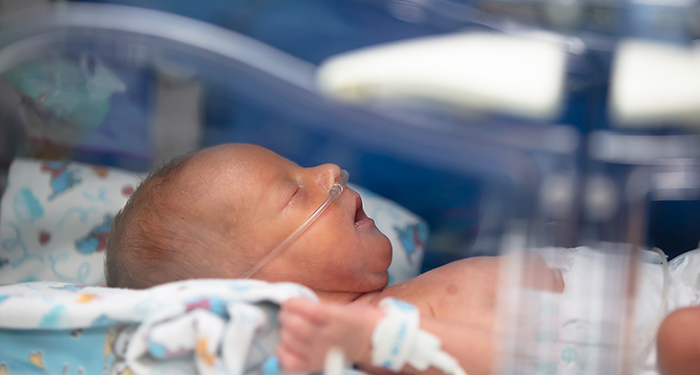Canadian Microbiome Initiative 2: Projects and Highlights Descriptions
Microbiome research core: helping scientists achieve impact

Imagine being born in a germ-free bubble. Your body is completely free of the microbes that normally live in the gut, lungs, and on the skin. You are essentially a clean slate for important research on how microorganisms affect health and development. This is the reality for the mice that live in the new gnotobiotic facility at the University of Calgary, a facility where all the microorganisms are known and controlled. The new facility is part of a research core providing Canadian researchers with the equipment, information, and collaborations they need to study the microbiome and its link to human health and disease.
Named IMPACTT, the research core is comprised of five platforms led by 16 scientific experts:
- Gnotobiotic animal models & intravital microscopy
- Human cohort design & analysis
- Microbial & human tissue
- Functional omics
- Computational development
Learn more on the IMPACTT Website.
Nominated Principal Investigator (NPI): Kathy McCoy
Funding Decisions Database – Detailed information
Harnessing the microbiome to treat inflammatory bowel disease

Inflammatory bowel disease (IBD), a chronic condition that damages the intestines, is becoming more common in Canada, especially among children. It is not clear why; and, adding further frustration, current medications used to treat IBD suppress a patient’s immune system, carry a number of safety risks, and don’t always work. In search of new solutions, a team of doctors and scientists found several types of unusual bacteria in patients’ intestines that trigger inflammation. Now, Dr. Bruce Vallance, an investigator at BC Children’s Hospital, and his research team are collecting samples from a network of 1,500 Canadian children and using specialized techniques to grow the unusual bacteria in large numbers. This will enable them to test how the bacteria stick to or invade human cells and how the bacteria cause disease when injected into mice. Ultimately, the team will develop new ways to target these bacteria to treat IBD in children.
Nominated Principal Investigator (NPI): Bruce A Vallance
Funding Decisions Database – Detailed information
Studying the role of the microbiome in cervical cancer

The connection between cervical cancer and the human papilloma virus (HPV) is well established, and it is also known that infection with HIV can exacerbate the problem. Recent findings also suggest that the bacterial communities living within the vagina are important for the clearance of HPV, but questions remain. Now, Dr. Adam Burgener, a professor at Case Western Reserve University and the University of Manitoba, and his international research team are studying the vaginal microbiome in people who have HPV infection with and without HIV. The team is using advanced molecular techniques to learn about the properties of vaginal bacteria to determine what role they play in disease, with the hope of finding new ways to treat and prevent cervical cancer.
Nominated Principal Investigator (NPI): Adam Burgener
Funding Decisions Database – Detailed information
How gut microbes affect autoimmunity and type 1 diabetes

The incidence of type 1 diabetes, an autoimmune disease, has been rising in developed countries at a rate of 3–5% per year over the past several decades. Our genes do not change this quickly, suggesting the influence of changing environmental factors. To shed light on this phenomenon, Dr. Jayne Danska, a senior scientist at SickKids Hospital, and her team are studying how environmental changes have influenced the gut microbiome in infants with genetic risk for type 1 diabetes. The team’s project is focused on finding what the gut microbes do inside the developing infant. They will study how exposure to gut bacteria can either protect from or trigger type 1 diabetes, and they will identify the immune responses influencing the development of the disease, with the goal of preventing and treating new onset of type 1 diabetes.
Nominated Principal Investigator (NPI): Jayne Danska
Funding Decisions Database – Detailed information
Studying the changing microbiome in type 2 diabetes

Studies show a link between obesity, type 2 diabetes, and changes in the composition of the gut microbiota. Surprisingly, bacteria and bacterial fragments are altered in the upper gut and selectively accumulate in the circulatory system, liver, and in various fat depots of people who are obese. Dr. André Marette, a professor at Université Laval, and his research team are studying the identity and function of the bacterial strains compartmentalized in specific segments of the gut versus in body tissues—and how that affects the progression of insulin resistance and type 2 diabetes. The goal is to foster collaboration among Canadian microbiome and diabetes experts and develop diagnostic, preventive, and therapeutic approaches for diabetes.
Nominated Principal Investigator (NPI): André Marette
Funding Decisions Database – Detailed information
The microbiome and pregnancy: A global health challenge

The gut microbiome has a profound influence on our ability to process and acquire nutrients. Despite the importance of nutrition during pregnancy, not much is known about the role of the microbiome in pregnancy and its impact on maternal health and birth outcomes. Of particular concern is how changes in the microbiome, such as those caused through exposure to pathogens, may promote undernutrition. To advance our understanding of the maternal microbiome and to improve global child health, Dr. John Parkinson, a Senior Scientist at the Hospital for Sick Children, and his research team are studying microbiome dynamics in two groups of young women—one group from Pakistan, and one group from Canada. Both groups will provide samples of their microbiomes, and computational analyses along with animal studies will enable the researchers to associate microbial communities and exposure to pathogens with maternal health and birth outcomes.
Nominated Principal Investigator (NPI): John Parkinson
Funding Decisions Database – Detailed information
How the microbiome affects asthma risk in premature infants

Thousands of Canadian children are born prematurely each year and are at increased risk of lung problems including recurrent wheeze and asthma. Recent studies suggest that the microbiome is a factor contributing to asthma, but premature infants have not been included in these studies and there are still a lot of unknowns. Dr. Marie-Claire Arrieta, an associate professor at the University of Calgary, and her team are studying the link between the microbiome and asthma in premature infants by applying powerful statistical tools in data collected from a longitudinal birth cohort of premature infants, the BLOOM Study. The team will then use animal models to determine the mechanisms by which specific microbes lead to allergic airway inflammation. Building on this knowledge, the team’s goal is to identify microbiome-based therapeutics to decrease the risk of asthma in premature infants.
Nominated Principal Investigator (NPI): Marie-Claire Arrieta
Funding Decisions Database – Detailed information
Investigating the link between breast milk, gut microbes, and asthma

Over the past eight years, nearly 3,500 babies and their families have participated in the CHILD Cohort Study—a study set up to uncover why some children develop asthma. Scientists working on the CHILD data have already made exciting discoveries about the importance of breast milk and gut bacteria in helping immune systems develop properly so that children don’t get asthma. Now, Dr. Padmaja Subbarao and Dr. Meghan Azad lead a national team of investigators making use of findings from the CHILD Cohort Study to guide their translational experiments in mice and cell culture systems. Using new technologies, the team aims to better understand how breast milk and gut bacteria affect immune development and asthma and to discover new ways to prevent and treat this common and costly disease.
Nominated Principal Investigator (NPI): Padmaja Subbarao and Meghan Azad
Funding Decisions Database – Detailed information
- Date modified: